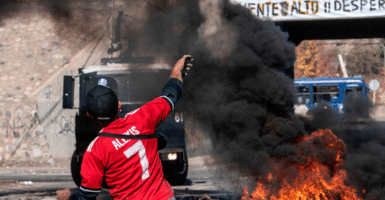Chile’s overall economic freedom score of 76.8 made the South American nation’s economy the 15th-freest in the world in The Heritage Foundation’s 2020 Index of Economic Freedom.
Although economic freedom in Chile declined under the last socialist government from 2013 through 2017, by 2018 the center-right administration of President Sebastian Pinera had put the economy back on an upward trajectory.
Prior to the coronavirus pandemic, growth in gross domestic product generally had been accelerating.
>>> What’s the best way for America to reopen and return to business? The National Coronavirus Recovery Commission, a project of The Heritage Foundation, assembled America’s top thinkers to figure that out. So far, it has made more than 260 recommendations. Learn more here.
Now, with demand for commodities falling due to the global impact of the coronavirus, Yahoo Finance reports the global copper market “will see a supply glut of 200,000 tons.” As the world’s leading producer of copper, that drop will hit Chile’s economy hard.
There is good news, however. Chile’s steady and sustained implementation of policies to expand economic freedom over many decades helped it to become South America’s wealthiest nation by far, according to the World Bank. Chile also has been a leader in the pivot from socialism to market democracy in Latin America.
That means that the Pinera government has had the resources to respond to the public health crisis more quickly and effectively than Chile’s neighbors have.
As Bloomberg reports, “Chile has tested a higher percentage of its residents than any other Latin American nation.” That, in turn, has enabled the government to design a “system of rolling obligatory quarantines based on a formula combining an area’s new cases per capita” that will be used to issue “immunity passes” to reopen the economy more quickly.
Ironically, the Pinera government’s push for legislative approval of additional business-friendly tax, pension, and regulatory reforms may get a second chance due to the crisis. So could legislative efforts to scale back changes enacted to the labor code under the prior government that contained “dozens of new rules intended to give unions more power,” according to Reuters.
The pandemic has quieted—at least for now—the social unrest and violent protests by the hard left that had stymied further liberalization in 2019. The riots and accompanying political instability had caused a serious deterioration of the rule of law that could have a negative impact on Chile’s economic freedom in the future.
The rule of law in Chile has stemmed, in large part, from robust protection of property rights, a genuinely independent judiciary, and low levels of corruption.
Given its deep reserves of not just copper but—more importantly—of economic freedom, Chile will be set to emerge from the pandemic with greater capacity to recover quickly and improve living standards for its people.
































